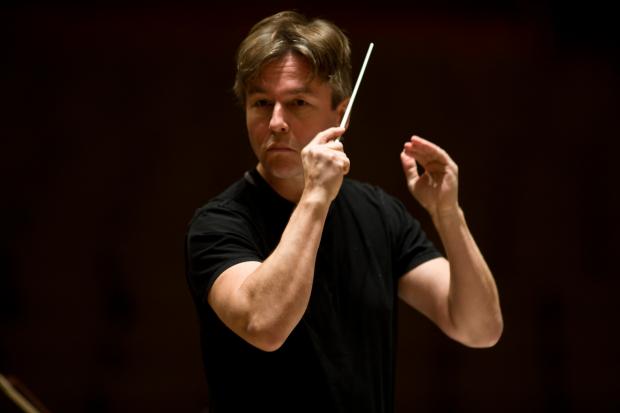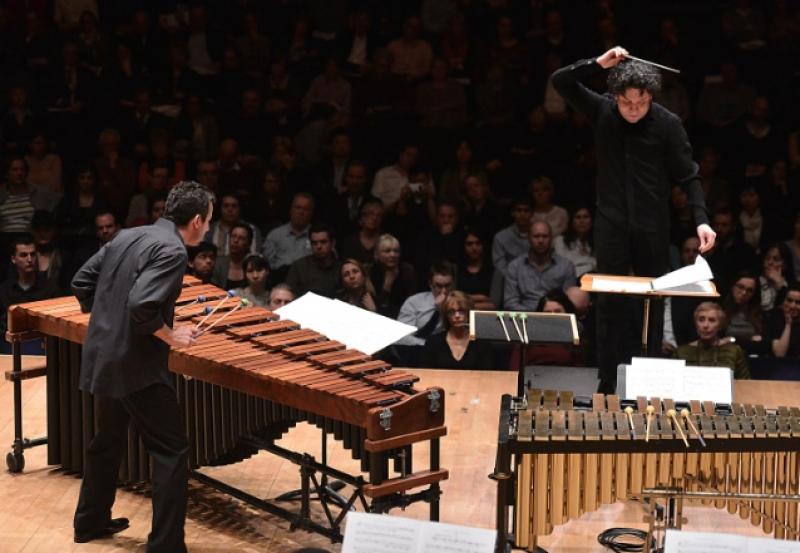 |
| Sakari Oramo |
Sakari Oramo’s inaugural concert as Chief Conductor of
the BBC Symphony Orchestra gave opportunities to explore existing preoccupations
– theirs and his. Oramo – no stranger to the British music world after ten
years at the helm of the City of Birmingham Symphony Orchestra – brought Mahler
to the table, a composer with whom he’s had an affinity for some time. The
Beeb, for their part, brought a substantial premiere by respected French
composer Tristan Murail, affirming a commitment to contemporary music
unparalleled among London’s symphony orchestras.
The title itself of Murail’s new piece, Reflections/Reflets, presages elements of
the first of the piece’s two movements. Murail takes as his starting point
Charles Baudelaire’s poem Spleen, not set vocally but rather painted in heavy
orchestral sound. The poem’s bells are there, tolling grimly at the first part’s
climax and the thick texture truly makes sonic sense of the opening line “When
the low and heavy sky presses like a lid”. It’s the skewed tuning, though, that
most clearly stems from that title – a cluster of wind instruments, just
slightly off the pitching of the rest of the orchestra, distorts everything we
hear, offering a cracked double image or a sullied reflection.
The second part, “High Voltage/Haute Tension”, darts of
with a nervous energy not possible in the first. Pointed piano writing
underlies much of the skittish but virtuosic orchestral writing, setting off
waves of upward-reaching scales that couldn’t be further removed from the
weighty import of the “Spleen” music. Murail intends these movements to be the
first in a cycle of pieces, and the BBC Symphony Orchestra launched them with
terrific power and commitment in this world premiere performance.
Something of the febrile energy of “High Voltage” was
echoed in Shostakovich’s Concerto for piano, trumpet and strings of 1933
(sometimes dubbed Piano Concerto No.1), particularly so here with the
hyper-detailed pianism of Olli Mustonen. I hadn’t seen Mustonen live before
this concert, having encountered him only through his recordings, but in the
event the visuals matched the eccentric intellectualism projected by his
playing. Mustonen lets no phrase rise and fall smoothly, preferring to poke odd
notes and send them out into the audience like barbs. His hands fly sometimes a
foot from the keyboard, striking from a height and only increasing that sense
of jaunty, jolting phrasing. It’s love-it-or-hate-it playing, sounding nothing
like anyone else I’ve ever heard, but there’s something curiously disarming
about it, as though Mustonen is dreaming his own quirky musical fantasy and
allowing us to peek over his shoulder.
The obligato trumpet part was here taken by Russian star
Sergei Nakariakov, whose quivering vibrato and silken tone were quite distinct
from Mustonen’s angularity, but they shared a stingingly incisive rhythmic sense
that made for a tremendously exciting finale. A little more tightness from the
accompanying strings would have raised the performance even more, but with so
much to intrigue and entertain, it seems churlish to complain. I can’t imagine that
I’d want to listen to Mustonen’s wacky phrasing for too long, though.
If Oramo’s contribution has gone uncommented upon until
now, it’s because the final item – Mahler’s First Symphony – was always going
to be the test of his command and ability. He set down an admired recording
with the Royal Stockholm Philharmonic Orchestra a couple of years ago and here
proved that he has something fresh and engaging to say in what is very
frequently trodden repertoire. I say fresh not so much in that his view is
wholly original, but rather that his approach drew out all that is youthful and
hopeful from this mighty work. His motions on the podium suggested strongly
that flow and lyricism were priorities, bringing out this music’s roots in song
(Mahler does, after all, make heavy reference to his earlier song cycle Leider eines fahrenden Gesellen). I’ve
rarely heard the scherzo infused with such a vigorous sense of dance, or the
first movement’s climactic explosion of light more awake and alert. Along the
way, he was given many moments of fine playing from the orchestra – some crisp
offstage brass, gutsy string playing and that
double bass solo negotiated with poise. What was missing, perhaps, was a real
sense of polish and refinement from the BBC SO. It sometimes seemed that Oramo
was pushing for more dynamic contrast that he was receiving in return, and
while there were never issues of ensemble, I missed the beauty of sound of
which this orchestra is capable. As inaugural concerts go, though, this was a
promising one – a strong sense here of a conductor with firm priorities and an
orchestra capable of delivering what he asks.

















